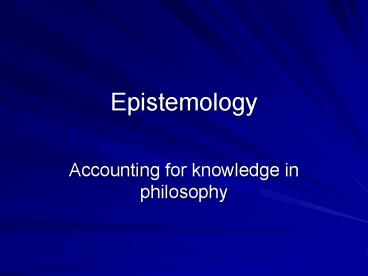Epistemology PowerPoint PPT Presentation
1 / 10
Title: Epistemology
1
Epistemology
- Accounting for knowledge in philosophy
2
Definitions
- Epistemology comes from the Greek word episteme
meaning knowledge or understanding. - Epistemology is the study or theory of knowledge.
- There is a difference between guessing and
knowing.
3
Defining the content of knowledge
- Propositional knowledge
- A proposition is a statement of fact in which
some thing or attribute is predicated of a
subject, linked by a being verb. - E.g. Dogs are furry animals 224
- The word know has several uses, not all of
which are propositional.
4
Testing Criteria
- In order to know a proposition,
- that proposition must be true.
- one must believe the proposition to be true.
- one able to provide adequate evidence that the
belief is true. - Knowledge justified true belief.
5
Detecting justified true belief
- How do philosophers determine whether or not a
statement is a justified true belief? - They make distinctions between
- A priori and a posteriori justification
- A posteriori on the basis of observation, only
on the basis of experience. Synonym is
empirical. - A Priori without relying on observation.
6
Justified True Belief, cont.
- And also make distinctions between
- Analytic and Synthetic Statements
- Analytic Relies solely on the definition of
terms. If you understand the terms, you can
justify the statement. - Synthetic Truth or falsity does not depend
solely of the definitions of its terms. It is
justified by information learned in the statement
which can be tested empirically. The information
contained in the statement must be synthesized.
7
The Pitfall of Logical Positivism
- Although it is helpful to make distinctions
between analytic and synthetic statements, it
does not follow that only such statements can be
counted as evidence of logically meaningful
statement. - The logical positivists verification principle
is self defeating, since it is neither true by
definition, nor can it be proved by sense
experience.
8
Justified True Belief, cont.
- We also distinguish between
- Logically Necessary and Logically Contingent
Statements - Logically Necessary statements must be true, or
stated differently, they cannot be false. It
will be true in every possible world - Logically Contingent statements are statements
that are true in some possible worlds but not in
others.
9
Modal Analysis
- Herman Dooyeweerd, A New Critique of Theoretical
Thought, 4 vols.,1953-1958 - A determination regarding which aspect or mode of
meaning is under discussion must be determined. - No mode or aspect by itself can explain all of
the others. All statements flow from faith
commitments. - Philosophy can hide religious ground motives by
appealing to a certain mode as ultimately
necessary.
10
Metaphysical Realities
- Metaphysical truths, then, are propositions which
can be demonstrated logically and related to a
transcendental norm. - They sometimes can be justified through
evidentiary means. - The burden of proof is upon atheists and agnostic
to demonstrate that their approach can provide a
satisfying theory of knowledge.

